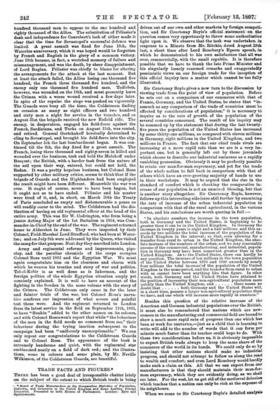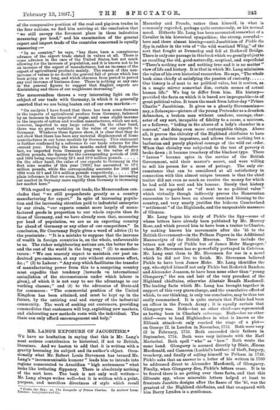TRADE FACTS AND FIGURES.*
THERE has been a good deal of irresponsible chatter lately on the subject of the extent to which British trade is being
- • Board of Trade Memorandum on the Comparative Statistics of Population, industry, and Commerce in the United Kingdom. and Some Leading Foreign Countries. Presented to both Houses of Parliament. London : Eyre and Spottiswoode.
driven out of our own and other markets by foreign competi. tion, and Sir Courtenay Boyle's official statement • on the
question comes very opportunely to throw some authoritative light upon it. We observe that the task was undertaken. in response to a Minute from Mr. Ritchie, dated August 19th last, a short time after Lord Rosebery's Epsom speech, in which he demonstrated to his own satisfaction that all was
over, commercially, with the small republic. It is therefore possible that we have to thank the late Prime Minister and his singularly loosely reasoned remarks and exaggeratedly pessimistio views on our foreign trade for the inception of this official inquiry into a matter which cannot be too fully illustrated.
Sir Courtenay Boyle gives a new turn to the discussion by viewing trade from the point of view of population. Before he sets out on a comparison of our commerce with that of France, Germany, and the United States, he states that "in- asmuch as any comparison of the trade of countries niust be affected by considerations of population," it is necessary to inquire as to the rate of growth of the population of the several countries concerned. The result of his inquiry may be summed up by the statement that during the last twenty- five years the population of the United States has increased by some thirty-one millions, as compared with eleven millions in Germany, eight millions in the United Kingdom, and two millions in France. The fact that our chief trade rivals are increasing at a more rapid rate than we are is a very im- portant one, but is generally left out by those jeremiads which choose to describe our industrial eminence as a rapidly vanishing possession. Obviously it may be perfectly possible to retain our man-for-man supremacy, and yet for the trade of the whole nation to fall back in comparison with that of others which have an ever-growing majority of hands to use in their workshops. It may be argued that the rise in the standard of comfort which is checking the comparative in- crease of our population is not an unmixed blessing, but that is another story altogether. Sir Courtenay Boyle, however, follows up this interesting side-issue still further by examining the rate of increase of the urban industrial population in comparison with that of the rural agricultural, in the various States, and his conclusions are worth quoting in full :—
"In absolute numbers the increase in the town population, both in Germany and the United States. is beginning to be greater than it can be in the -United Kingdom. In Germany the increase in twenty years is eight and a half millions and this ex- ceeds by two millions the total increase of the population of the United Kingdom in the interval; so that, even allowing for a transfer from rural to urban in the United Kingdom, the abso- lute increase of the numbers of the urban, and we may reasonably assume of the commercial, manufacturing, and industrial, popula- tion in Germany may have been somewhat greater than in the United Kingdom. As to the United States, there can hardly be any question. The increase of ten millions in the town population of the United States between 1870 and 1890 exceeds by nearly four millions the total increase'of the population of the United Kingdom in the same period, and the transfer from rural to urban with us cannot have been anything like that figure. In other words, both Germany and the United States have attained to the position of increasing their non-agricultural population more
quickly than the United Kingdom, and there seems no doubt that both Germany and the United States will, in a short time, possess a larger non-agricultural population than we have, and one which will increase more rapidly in numbers."
Besides this question of the relative increase of the American and German industrial populations over the British, it must also be remembered that nations which are new- comers in the manufacturing and commercial field are bound to show a much more rapid rate of progress than one which has
been at work for centuries,—just as a child that is learning to write will add to the number of words that it can form per minute much faster than its teacher could hope to do. With these two considerations before us, it is obviously impossible to expect British trade always to keep the same share of the commerce of the world in its hands. We could only do so by
insisting that other nations should make no industrial progress, and should not attempt to follow us along the road to wealth and comfort; and even Lord Rosebery would hardly make such a claim as this. All that we can expect from our manufacturers is that they should maintain their man-for- man supremacy, which they are evidently doing, as we shall see later. For the rest, let us get rid of the mediieval delusion which teaches that a nation can only be rich at the expense of its neighbours.
When we come to Sir Courtenay Boyle's detailed analysis
of the comparative position of the coal and pig-iron trades in the four nations, we find him arriving at the conclusion that " we still occupy the foremost place in these industries measuring per head," and his examination of the general export and import trade of the countries concerned is equally reassuring :—
"In no country," he says, "has there been a conspicuous advance of the export trade stated in values at all. There is some advance in the case of the United States, but not much allowing for the increase of population, and it is known not to be an increase of the export of manufactures, but an increase of the export of agricultural products mainly. The reason of this non- increase of values is no doubt the general fall of prices which has been going on so long, and which obscures from period to period any real increase of business done. There is nothing at any rate in the general figures to suggest that English exports are diminishing and those of our neighbours increasing."
The memorandum throws a very interesting light on the subject of our trade with Germany, in which it is generally asserted that we are being beaten out of our own markets :—
" On analysis I have found that there has been some decrease in the imports of agricultural produce from Germany, balanced by an increase in the imports of sugar, and some slight increase in the imports of cotton and woollen manufactures, which are not, however, imported to any large extent. On the other hand, there was no great variation in the value of our exports to Germany. Whatever these figures show, it is clear that they do not show that there has been any material displacement of home manufactures in our home markets by Germany. This statement is further confirmed by a reference to our trade returns for the current year. During the nine months ended 30th September last, we imported from Germany goods to the value of 201 million pounds, the figures for the corresponding periods of 1895 and 1894 being respectively 191 and 19.9 million pounds On the other hand, the value of our exports to Germany in the first nine months of this year [1896] has amounted to 17-1 million pounds, while the corresponding amounts for 1895 and 1894 were 15.1 and 13.4 million pounds respectively The plain inference is that we seem, for the moment, to be increasing our market in Germany more rapidly than Germany is increasing her market here."
With regard to general export trade, the Memorandum con- cludes that "we still preponderate greatly as a country manufacturing for export." In spite of increasing popula- tion and the increasing attention paid to industrial enterprise by our rivals, "our exports consist more largely of manu- factured goods in proportion to our whole exports than do those of Germany, and we have already seen that, measuring per head of population, we are as an exporting country far ahead of Germany or any other of our competitors." In conclusion, Sir Conrtenay Boyle gives a word of advice (1) to the pessimists : "It is a mistake to suppose that the increase of wealth in foreign countries is, on the whole, unfavourable to us. The richer neighbouring nations are, the better for us and the rest of the world in the long run;" (2) to manufac- turers: "We can scarcely expect to maintain our past un- doubted pre-eminence, at any rate without strenuous effort, &c.;" (3) to Labour : "Any step which facilitates the transfer of manufacturing power from this to a competing country must expedite that tendency [towards en international assimilation of the circumstances under which labour is given], of which it is not easy to see the advantage to our
working classes ; " and (4) to the advocates of State-aid for commerce : "The commercial position of the United Kingdom has been attained, and must be kept up in the future, by the untiring zeal and energy of the industrial community. The work of seeking out customers, providing
commodities that customers will buy, exploiting new markets, and elaborating new methods meta with the individual. The State can only afford encouragement and help."



































 Previous page
Previous page